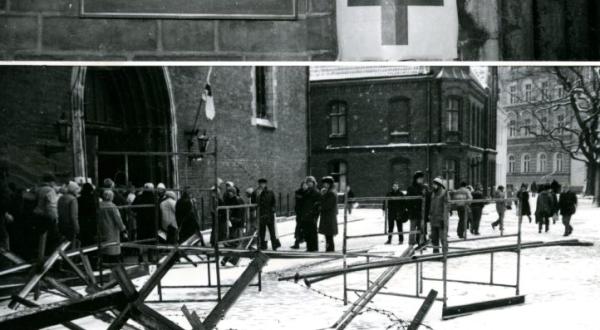Looking back at the First World Congress of Latvian Physicians
Exactly 30 years ago the First World Congress of Latvian Physicians was held from 18 to 27 June 1989. The congress attracted 6 000 medical professionals from all over the world, including over 1 000 nurses from Latvia and abroad.
At that time Latvia was still part of the USSR, and this forum was an important milestone in the restoration of the independence of Latvia. Professor Viktors Kalnbērzs from the Riga Medical Institute (RMI), who had great professional and political influence, played an important role in organising the congress. The organising committee consisted of people who were or would become lecturers – Georgs Andrejevs, Viesturs Boka, Haralds Jansons, Jānis Kupčs, Juris Leja, Iveta Ozolanta, Aivars Vētra and Jānis Vētra. Professor Ilmārs Lazovskis was also actively involved.
Professors Ilmārs Lazovskis, Aina Dālmane, Maija Eglīte and other participants of the congress. Photo from the RSU Museum of History archives.
The newspaper Latvijas Ārsts (Latvian Physician) was published during the congress. It contained several critical articles about the quality of medical education. It should be noted that this was historically the time when the expressions glasnost (“transparency” in Russian) and perestroika (“restructuring” in Russian) were used to call for greater freedom of expression and economic reform. Criticism of many aspects of the Soviet system was common at the time.
A number of important proposals were outlined during the congress that influenced society, and later also shaped the development of Rīga Stradiņš Universtiy (RSU). Assistant Professor Andrejs Rauhvargers writes the following in the 5th Issue of Latvijas Ārsts: ‘Our University is called Riga Medical Institute. In most countries, prospective doctors study in universities at faculties of medicine, so when you talk to doctors and teaching staff from international universities, it takes a long time to explain what a “medical institute” is – whether it is a medical college, a nursing school or something else. In my opinion, it would be useful to change our status and to become a medical academy or university as is befitting for an institution of higher education where you can also defend dissertations in front of specialist councils.’ This proposal was implemented a year later when Riga Medical Institute was renamed Medical Academy of Latvia (MAL).
Several essential decisions were made during the congress which played an important role in the creation of several new study programmes and faculties at RSU, these include: a recommendation for RMI to create a several-year long course for head nurses to get a higher education; a call to educate more mid-level medical staff (hygienists) which is a necessary step in the reduction of dental caries as well as periodontal diseases in Latvia; the idea to start preparing physiotherapists with secondary special education at the medical school to fit the needs of rural ambulatory care providers, as well as at regional hospitals.
A Nursing programme was established at MAL in 1990, and has been implemented since 1993 by the Faculty of Nursing. The School of Dental Hygiene was founded in 1995 within the Faculty of Dentistry at MAL. The recommendation to start preparing professional physiotherapists at higher education level was implemented in 1993, and a year later the Faculty of Rehabilitation was established at MAL.






